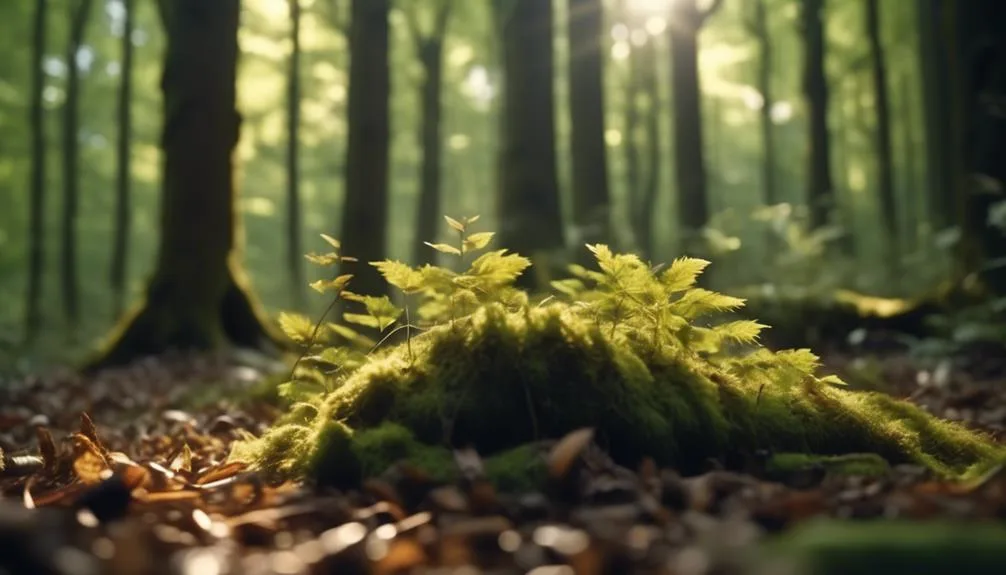Beech trees may not seem like much, but they actually have a big impact on wildlife and plant diversity. These trees offer shelter and food for many animals and influence the variety of plant species around them. Their role in ecosystems is crucial.
There's a lot more to learn about how beech trees benefit biodiversity. This exploration will reveal the surprising ways they contribute to the health of our environment.
Beech Trees and Biodiversity
Beech trees play a crucial role in supporting biodiversity by providing food and habitat for a wide range of species. Their fallen leaves contribute to soil fertility, enriching the forest floor with essential nutrients. This process enhances the growth of diverse plant species, creating a thriving ecosystem.
Additionally, beech trees are excellent at carbon sequestration, capturing and storing carbon dioxide from the atmosphere. This not only helps mitigate climate change but also contributes to the overall health of the environment.
The dense canopies of beech forests provide shelter for various animals, from insects to birds and mammals. As you explore the depths of a beech forest, you'll witness firsthand the interconnectedness of life it supports, showcasing the vital role these trees play in maintaining biodiversity.
Impact of Beech Trees on Wildlife
Supporting a rich array of wildlife, beech trees foster a thriving ecosystem that sustains a diverse range of species, from insects to birds and mammals.
The dense canopy of beech trees provides excellent nesting sites and shelter for various bird species, while the fallen leaves and decaying wood create ideal habitats for insects and small mammals.
These trees also play a crucial role in maintaining the balance of the ecosystem by influencing species interaction. For instance, the nuts produced by beech trees are a vital food source for many woodland creatures, which in turn helps in supporting the overall biodiversity.
Additionally, the ecological impact of beech trees extends to the forest floor, where their leaf litter enriches the soil, providing food and shelter for a myriad of organisms.
Beech Trees and Plant Diversity
Contributing to the rich tapestry of plant life in their surroundings, beech trees play a vital role in supporting a diverse array of plant species within their ecosystem.
Their dense canopy cover creates unique light conditions on the forest floor, fostering a variety of shade-tolerant plants.
Additionally, beech trees influence soil composition through their leaf litter, which decomposes to create a nutrient-rich layer, benefiting many understory plants.
This rich organic layer also encourages mycorrhizal fungi, further enhancing plant diversity.
Furthermore, the thick, insulating layer of beech leaf litter provides a favorable environment for germination and growth of various plant species.
As a result, the presence of beech trees significantly contributes to the overall plant diversity within their habitat, making them a crucial component of diverse and thriving ecosystems.
Role of Beech Trees in Ecosystem Health
Having explored the significant impact of beech trees on plant diversity, it's crucial to now examine their role in promoting overall ecosystem health.
Beech trees play a vital role in maintaining ecosystem stability. Their dense canopies provide shade and moisture retention, creating a suitable environment for various plant and animal species.
Additionally, beech trees contribute to soil health by producing a thick layer of leaf litter that decomposes slowly, enriching the soil with organic matter and nutrients. This enriches the soil, encouraging the growth of diverse plant species, and supporting a wide range of organisms within the ecosystem.
Furthermore, the extensive root systems of beech trees help prevent soil erosion, stabilizing the landscape and promoting overall ecosystem resilience.
In essence, beech trees are fundamental in maintaining the health and equilibrium of the ecosystems they inhabit.
Conservation Value of Beech Trees
The conservation value of beech trees lies in their ability to sustain a rich and diverse ecosystem, supporting a wide array of plant and animal species. These trees provide significant conservation benefits by serving as habitats for various organisms.
Beech forests are of great ecological significance as they support numerous species of birds, mammals, insects, and fungi. The dense canopies of beech trees offer shelter and nesting sites for birds, while the fallen leaves create a rich habitat for insects and small mammals.
Additionally, the nuts produced by beech trees are an essential food source for many wildlife species, further contributing to the overall biodiversity of the ecosystem.
Conclusion
In essence, the presence of beech trees significantly contributes to biodiversity by offering habitats for wildlife, supporting diverse plant species, and bolstering ecosystem health.
Safeguarding the well-being of beech trees is vital for preserving biodiversity and sustaining our natural environments.
Take a moment to recognize the invaluable role beech trees play in nurturing the diversity of life around us.

My interest in trees started when I first saw the giant sequoias in Yosemite.
I was a teenager then, and I remember thinking, “I need to learn more about this.”
That moment stuck with me.
A few years later, I went on to study forestry at Michigan Tech.
Since graduating, I’ve worked in a mix of hands-on tree care and community education.
I’ve spent over ten years helping people understand how to plant, maintain, and protect the trees in their neighborhoods.
I don’t see trees as just part of the landscape.
They are living things that make a real difference in our daily lives.
